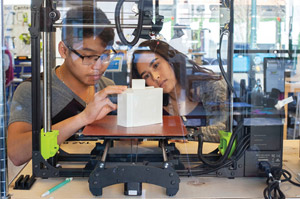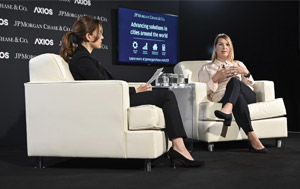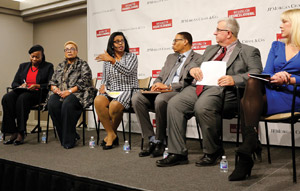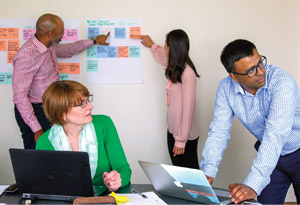Corporate Responsibility
As the world faces the health and economic consequences of COVID-19, the challenges ahead are a stark reminder that too many people already struggle with economic insecurity every day. This struggle will likely escalate as this public health crisis continues to disrupt the global economy.
Now more than ever, business must step up and collaborate with local, civic and government leaders to lend our expertise toward solutions that support our customers, communities and employees in need. Business Roundtable’s recent Statement on the Purpose of a Corporation made clear that America’s largest companies must operate for the benefit of all stakeholders, and we must be there for them in both good and challenging times.
For JPMorgan Chase, this means bringing the full force of our business to lift up those we serve around the world, focused on where we can deliver the greatest impact and reinvigorate the global economy to benefit more people.
In response to COVID-19 and in addition to efforts across the firm to support our customers and employees in need, we made an initial $50 million philanthropic commitment to help those most affected by humanitarian challenges, as well as sustainable and innovative solutions to help small businesses and underserved communities recover when the crisis subsides. We will continue to focus on areas where we can leverage our core business, philanthropy and policy expertise to help the most vulnerable in the short and long term. In addition to supporting small businesses, this approach has effectively informed and scaled solutions across pillars that will remain critical to helping those most vulnerable as they face financial hardship and uncertain work opportunities, including neighborhood development, financial health, and jobs and skills.
Our ongoing efforts to help prepare workers for the future of work exemplify this strategy in practice. As technology alters nearly every facet of work, the education and skills that people need are rapidly changing. We have combined our resources and reach to give people the education and skills they need to succeed. We have committed $350 million globally to support and scale the most effective local initiatives to equip people with in-demand skills. This investment will be even more critical given the recent unforeseen disruption in the global economy and the longer-term need to rebuild the labor market. From Delhi to Detroit, efforts focused on opportunity and inclusivity, like career and technical education in high schools to apprenticeships in growing industries, are preparing more people to launch successful careers. Additionally, in partnership with our Human Resources team, we’re redefining how we train and develop our employees by identifying future-critical skills.
Scaling the most effective programs and creating greater economic opportunity for the most vulnerable will require thoughtful and effective public policy. Last year, we launched the JPMorgan Chase PolicyCenter to advance policies at the federal, state and local levels that strengthen communities and change lives. Business leadership in developing policy solutions is critical as we work to address the longer-term impact of this crisis. We have a track record of supporting policies that provide economic opportunity to more people, including by giving those who have a criminal history a second chance. We are advocating at the state and federal levels for reforms including “banning the box,” establishing automatic record expungement for certain offenses and promoting fair-chance hiring in the financial services sector. In 2019, our firm gave second chances to 3,000 people in the U.S. with criminal backgrounds.
As the world responds to this health and economic crisis, we will need to be nimble and lean into our strengths to best support those who have been most vulnerable to economic disruption. We will continue to apply what we learn to scale solutions, deepen our impact and support our customers, communities and colleagues. Make no mistake: An inclusive economy is a stronger economy, and we all have an interest in that.

Peter L. Scher
Head of Corporate Responsibility and Chairman of the Mid-Atlantic Region
Creating an economy that works for more people
Companies like ours have a responsibility to step up and help solve pressing challenges. When communities do well, our firm does well. This conviction is reflected in how JPMorgan Chase does business every day. We’re investing in our customers, employees and communities around the world to break down barriers to opportunity and create an economy that works for more people.
We are combining our business and policy expertise, sustainable business practices, data, capital and global presence to advance solutions worldwide. Our efforts focus on five key areas where we believe we can make the greatest impact: jobs and skills, neighborhood development, small business expansion, financial health and sustainability.
Advancing policy solutions
Public policy is a critical tool to scale the most innovative and impactful approaches that bring about lasting change. In 2019, we launched the JPMorgan Chase PolicyCenter to develop and advance sustainable, evidence-based policy solutions that drive inclusive economic growth in the U.S. and around the world.
Through the PolicyCenter, we are advancing policy changes to remove barriers to employment for people with a criminal background and advocating for policy solutions that will enable more young people — particularly those who lack opportunity — to access high-quality career-readiness programs that pave the way to well-paying jobs. In 2020, the PolicyCenter will expand its focus to tackle additional issue areas.
Harnessing the power of data
Sound public policy is informed by timely, granular data. The JPMorgan Chase Institute is dedicated to delivering data-rich analyses and expert insights for the public good. Leveraging the firm’s unique assets and proprietary data, the Institute helps policymakers, businesses and nonprofit leaders use timely data and thoughtful analyses to address critical issues and advance global prosperity.
Our data allow us to better understand and answer important questions about the financial health and resilience of U.S. consumers, businesses and communities, as well as study labor and financial markets. In 2019, the Institute shared valuable insights across a range of areas, including how student loan payments affect the financial lives of 4.6 million families; how Miami’s small businesses turn a profit yet have limited cash buffers; and how families are weathering financial volatility on a monthly basis.
Preparing workers for the future of work
 Technological change continues to transform
the world of work. By 2030, more than 30% of
American workers and 375 million workers
globally will need to change jobs or upgrade
their skills significantly in order to advance
within the workforce. We are investing $350 million
over the next five years to equip young
people and adults with the skills they need to be
successful in a rapidly changing economy. We
are working to create greater economic mobility
and career pathways for workers both inside
our firm and in our communities. Our firm is
investing in our employees through long-term
training and reskilling efforts. We are also
making long-term commitments to boost career
readiness. We invested $7 million in Denver,
Colorado’s youth apprenticeship system to
develop strong connections between high
schools and higher education, focused on well-paying
careers in the region’s growing industries.
Technological change continues to transform
the world of work. By 2030, more than 30% of
American workers and 375 million workers
globally will need to change jobs or upgrade
their skills significantly in order to advance
within the workforce. We are investing $350 million
over the next five years to equip young
people and adults with the skills they need to be
successful in a rapidly changing economy. We
are working to create greater economic mobility
and career pathways for workers both inside
our firm and in our communities. Our firm is
investing in our employees through long-term
training and reskilling efforts. We are also
making long-term commitments to boost career
readiness. We invested $7 million in Denver,
Colorado’s youth apprenticeship system to
develop strong connections between high
schools and higher education, focused on well-paying
careers in the region’s growing industries.
Boosting small business growth
Through our long-term investments around the world, we have seen firsthand how underserved, minority entrepreneurs have the power to lift up entire communities. Yet these populations often face unique barriers that inhibit their success. This is why our efforts focus on unleashing their power as drivers of opportunity. We have taken many insights learned from innovative models, such as the Entrepreneurs of Color Fund (EOCF), and are applying them to more communities. For example, in Paris, we’re working with nonprofit partners to help local and diverse entrepreneurs in Seine-Saint-Denis grow their businesses. In London, we’re giving a boost to female entrepreneurs by providing technical support and hands-on mentorship.
Cultivating thriving neighborhoods
Housing that individuals and families can afford, in proximity to economic opportunity and basic services, is the cornerstone of vibrant and resilient neighborhoods. Producing, preserving and protecting affordable housing is essential to our strategy for creating thriving neighborhoods. For example, we’re investing $22 million to develop and preserve affordable housing in San Francisco and Oakland. This investment, which combines long-term, low-cost loans and philanthropic capital, will provide more affordable housing and protect local residents from being displaced.
Advancing financial health
Sound financial health is the foundation on which strong and resilient households, communities and economies are built. We’re using our data, expertise and capital to improve the financial health of customers, employees and communities. In 2019, JPMorgan Chase made a $25 million commitment to the Financial Solutions Lab, which supports technology-based innovations that improve financial health. This investment builds on our five-year collaboration with the Financial Solutions Lab, which has supported nearly 40 innovative financial technology companies (fintechs) that have raised over $500 million in capital since joining the program, saving U.S. residents more than $1 billion.
Transitioning to a low-carbon economy
JPMorgan Chase is committed to creating a more sustainable future for our employees, customers and communities. Our firm has committed to facilitate $200 billion in financing in 2020 to support the objectives of the United Nations’ Sustainable Development Goals, with a focus on addressing climate change and advancing social and economic development.
We are also promoting bipartisan, market-based policy solutions — such as a carbon tax-and-dividend framework for the U.S. — to reduce carbon emissions and protect consumers. And we’ve expanded restrictions on financing for coal mining and coal-fired power and prohibited financing for new oil and gas development in the Arctic. Finally, we’re on track to source renewable energy for 100% of our own global power needs by the end of 2020.
2019 Highlights and Accomplishments
Awards and recognition
- Ranked Top 10 on Fortune magazine's World's Most Admired Companies list
- Named to Fortune magazine’s Change the World list — third consecutive year
- Named to Military Times' Best for Vets Employers list
- Earned 100% on the Human Rights Campaign’s Corporate Equality Index — 17th consecutive year
- Inducted into the Billion Dollar Roundtable for attaining at least $1 billion in diverse supplier spend
Accomplishments
- AdvancingCities: Bolstering the long-term
vitality of the world’s cities through low-cost,
long-term loans and philanthropic
investments:
‐ Detroit: Six years into our $200 million commitment:
 14,728 people participated in workforce
training programs; 2,002 units of affordable
housing were created or preserved;
17,255 people received services to
improve their financial health; 3,855
jobs were created or retained; and 7,718
small businesses received capital or
technical assistance
14,728 people participated in workforce
training programs; 2,002 units of affordable
housing were created or preserved;
17,255 people received services to
improve their financial health; 3,855
jobs were created or retained; and 7,718
small businesses received capital or
technical assistance
‐ Chicago’s South and West sides: Two years into our $40 million commitment:
6,362 people participated in workforce training programs; 48 units of affordable housing were created or preserved; 49,314 people received services to improve their financial health; 2,323 jobs were created or retained; and 3,305 small businesses received capital or technical assistance
‐ Greater Paris: First year of our $30 million commitment:
4,000 people participated in career-readiness programs; 12 small businesses received capital or technical assistance
‐ Greater Washington region: Two years into our $25 million commitment:
224 people participated in workforce training programs; 955 units of affordable housing were created or preserved; 1,120 jobs were created or retained; and 2,092 small businesses received capital or technical assistance

‐ Bay Area: New $75 million, five-year commitment to help address housing affordability and displacement challenges in San Francisco and Oakland.
‐ The inaugural AdvancingCities competition — which sources innovative and sustainable solutions that address pressing challenges facing communities — awarded a total of $15 million to winning cities: Chicago, Louisville, Miami, San Diego and Syracuse.
- Jobs and skills: Over the past six years, we have helped more than 150,000 people across 37 countries develop in-demand skills for jobs in growing industries.
- Financial health: In India, the Financial Inclusion Lab has supported 18 fintechs, which have expanded their services to reach more than 900,000 people in underserved communities in the country. Additionally, we committed $15 million to the Catalyst Fund, in partnership with UK Aid, to advance financial inclusion in emerging markets.
- Neighborhood development: To date, we’ve hosted six Partnerships for Raising Opportunity in Neighborhoods (PRO Neighborhoods) competitions, awarding more than $131 million to over 95 Community Development Financial Institutions across the U.S. As of 2019, the winners raised more than $870 million in outside capital and made over 35,000 loans worth in excess of $475 million dedicated to low- and moderate-income communities.
- Small business expansion: We expanded EOCF to five metros — Detroit, Chicago, the South Bronx, the Bay Area and the Greater Washington region — providing minority entrepreneurs with access to capital, education and other resources. Through 2019, we committed over $17 million through EOCF, resulting in more than 475 loans, totaling $17 million in deployed loan capital that created or retained over 3,000 jobs.
- Sustainable finance: In 2019, we provided over $3 billion for wind and solar projects. Since 2003, JPMorgan Chase has committed or arranged $24 billion in financing for wind, solar and geothermal projects.
- Employees serving our communities:
‐ Nearly 73,000 employees volunteered 467,000 hours in 2019. This includes 325 employee volunteers from 14 countries who contributed nearly 20,000 hours working with about 70 nonprofits through the JPMorgan Chase Service Corps.

‐ More than 400 employees contributed to the Board Match program, which doubles the impact of eligible employees’ donations to nonprofits on whose boards they serve, resulting in the firm matching more than $1.6 million to those organizations.
‐ In 2019, our firm and employees donated more than $2.8 million to disaster relief efforts around the globe.
